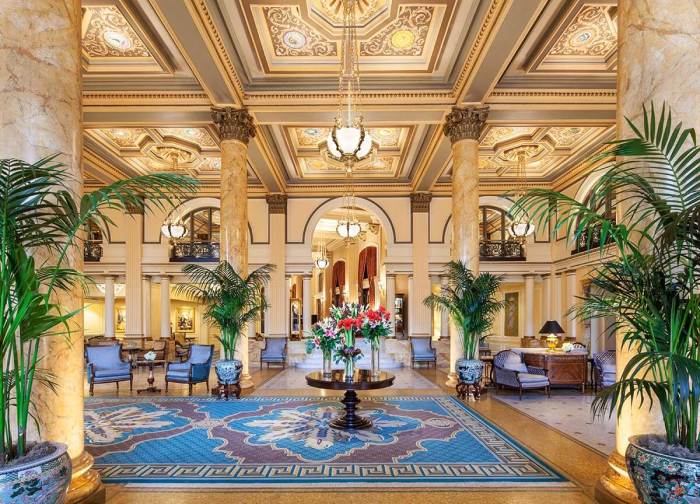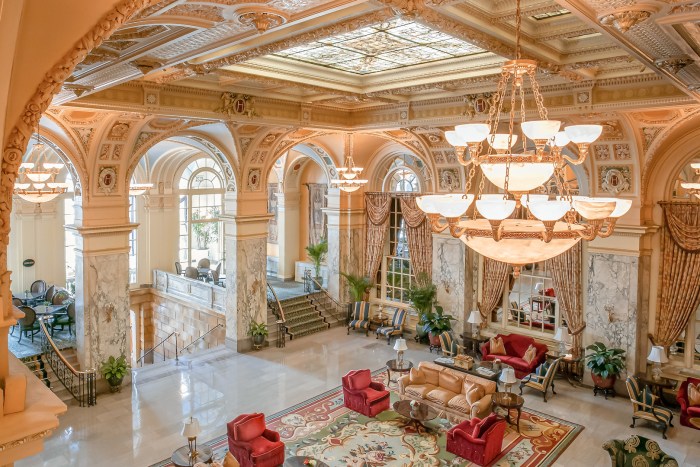
Embark on a journey into the world of Affordable Historic Hotels, where the allure of the past meets the comfort of the present. From grand historic landmarks to hidden gems, discover the perfect blend of history and affordability in these unique accommodations.
Learn about the concept of affordable historic hotels, explore examples from around the globe, and uncover the perks of immersing yourself in history without breaking the bank.
Affordable Historic Hotels
Affordable historic hotels offer a unique opportunity to stay in accommodations with rich historical significance at a budget-friendly price. These hotels often preserve the charm and character of their original architecture while providing modern amenities for guests.
Examples of Affordable Historic Hotels
1. Shelburne Hotel & Suites by Affinia
-Located in New York City, this hotel dates back to the early 1920s and offers affordable rates for a historic stay in the heart of Manhattan.
2. Hotel Alex Johnson
-Situated in Rapid City, South Dakota, this historic hotel combines affordability with a rich history dating back to the 1920s.
3. The Queen Mary
-Docked in Long Beach, California, this iconic ocean liner turned hotel offers affordable rates for a unique historic experience on the water.
Benefits of Staying in Affordable Historic Hotels
- Immerse yourself in history and experience the charm of a bygone era.
- Enjoy unique architectural details and period-specific decor.
- Experience personalized service in a setting with a rich heritage.
- Discover stories and anecdotes that add depth to your stay.
- Support the preservation of historic buildings and landmarks.
Characteristics of Historic Hotels

Historic hotels are known for their unique charm, rich history, and timeless appeal. These properties have stood the test of time and offer guests a glimpse into the past while providing modern comforts.
Common Features in Historic Hotels
- Architectural details: Historic hotels often boast stunning architecture, intricate details, and period-specific design elements that showcase the craftsmanship of bygone eras.
- Historical significance: These hotels are typically located in buildings that have a rich history, such as former palaces, mansions, or landmarks, adding to their allure.
- Ambiance and atmosphere: Historic hotels exude a sense of elegance, sophistication, and nostalgia, creating a unique ambiance that transports guests to another time.
- Antique furnishings: Many historic hotels feature antique furniture, artwork, and decor pieces that add to the overall charm and character of the property.
- Preserved heritage: These hotels often take great care to preserve and showcase their heritage, offering guided tours, historical exhibits, and storytelling sessions for guests.
Comparison with Modern Accommodations
While historic hotels offer a one-of-a-kind experience steeped in tradition and culture, modern accommodations focus on contemporary design, technology, and amenities. Here are some key differences:
- Design and architecture: Historic hotels feature old-world charm and unique architectural details, whereas modern accommodations prioritize sleek, minimalist design and cutting-edge architecture.
- Amenities and facilities: Historic hotels may have limited amenities compared to modern accommodations, which offer a wide range of facilities such as spas, fitness centers, and high-tech gadgets.
- Cultural experience: Staying at a historic hotel allows guests to immerse themselves in the local culture and history, while modern accommodations offer a more standardized experience catering to global travelers.
- Personalized service: Historic hotels often provide personalized service and attention to detail, focusing on creating a memorable stay for each guest, while modern accommodations may offer more streamlined and efficient service.
Preservation of Historic Hotels

Preserving historic hotels is crucial for maintaining the cultural and architectural heritage of a region. These establishments not only hold historical significance but also contribute to the unique charm and character of a destination.
However, preserving historic hotels comes with its own set of challenges. One of the main obstacles is balancing the need for modern amenities and comforts with the preservation of the building’s historical integrity. Renovations and updates must be carefully planned to ensure that the original architecture and design elements are not compromised.
Successful Preservation Projects in Historic Hotels
- The Stanley Hotel in Colorado is a prime example of a successful preservation project. Built in 1909, this historic hotel has undergone extensive restoration work to preserve its original grandeur while incorporating modern conveniences for guests.
- The Plaza Hotel in New York City is another notable example of successful preservation. This iconic hotel, which opened in 1907, has been meticulously maintained to showcase its Beaux-Arts architecture and luxurious interiors.
- The Fairmont Chateau Frontenac in Quebec City is a historic hotel that has managed to preserve its heritage while continuously adapting to meet the needs of modern travelers. The hotel’s preservation efforts have helped it maintain its status as a landmark destination.
Experience at Historic Hotels
When staying at a historic hotel, guests can expect a one-of-a-kind experience that blends the charm of the past with modern amenities. These hotels often have unique architecture, rich history, and a sense of nostalgia that transports guests to a different era.
Unique Experiences at Historic Hotels
- Immersive ambiance: Historic hotels offer a chance to immerse oneself in the ambiance of a bygone era, with well-preserved decor and furnishings.
- Personalized service: Guests can expect personalized service that caters to their individual needs and preferences, creating a memorable stay.
- Cultural heritage: Many historic hotels are located in culturally significant areas, providing guests with a deeper connection to the destination’s history.
Tips for First-Time Travelers
- Research the hotel’s history: Familiarize yourself with the hotel’s background and significance to fully appreciate your stay.
- Respect the heritage: Be mindful of the historic nature of the hotel and follow any guidelines or restrictions in place to preserve its integrity.
- Engage with the staff: Take the time to interact with the staff members who often have fascinating stories and insights about the hotel’s past.
Guest Stories and Reviews
“Staying at a historic hotel was like stepping back in time. The attention to detail and the sense of history made my stay truly unforgettable.”
Sarah, guest at a historic hotel
“I was blown away by the charm and elegance of the historic hotel I stayed at. It was a unique experience that I will always cherish.”
Michael, guest at a historic hotel
As we wrap up our exploration of Affordable Historic Hotels, it’s clear that these hidden treasures offer a one-of-a-kind travel experience. Whether you’re a history enthusiast or simply seeking a unique stay, these budget-friendly historic hotels hold the key to a memorable journey back in time.
FAQs
Are affordable historic hotels only found in specific regions?
Affordable historic hotels can be found worldwide, offering a diverse range of options for travelers.
What amenities can I expect at affordable historic hotels?
While amenities vary, many affordable historic hotels offer unique historical charm, personalized service, and a glimpse into the past.
Do I need to book in advance to stay at affordable historic hotels?
It’s advisable to book in advance, especially during peak travel seasons, to secure your stay at these popular historic accommodations.





